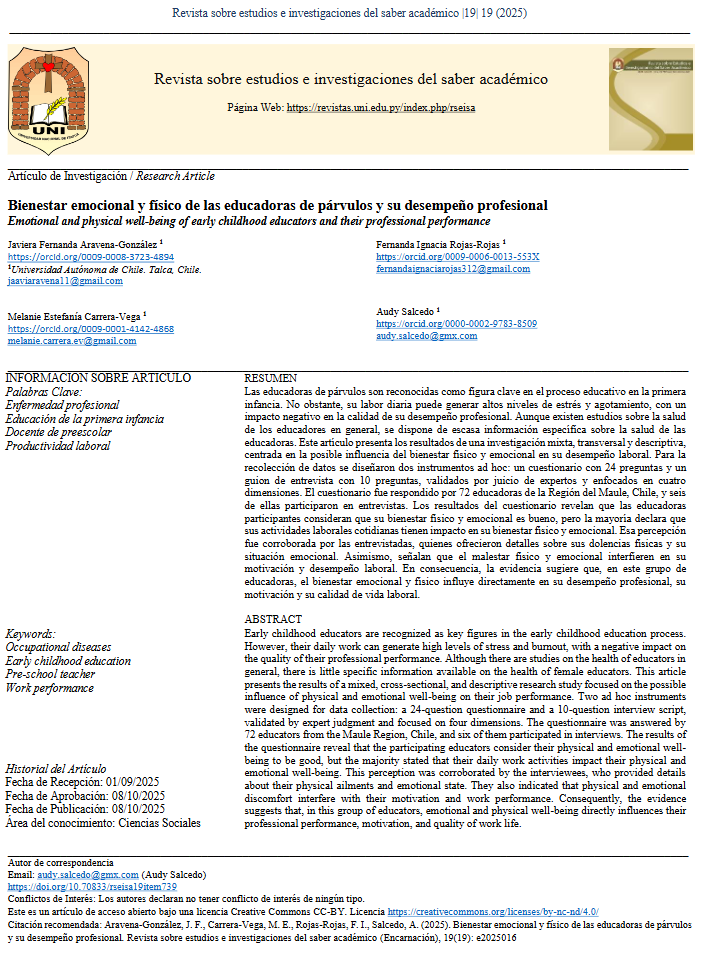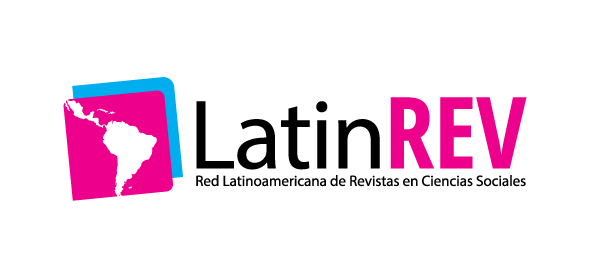Emotional and physical well-being of early childhood educators and their professional performance
DOI:
https://doi.org/10.70833/rseisa19item739Keywords:
Occupational diseases, Early childhood education, Pre-school teacher, Labour productivityAbstract
Early childhood educators are recognized as key figures in the early childhood education process. However, their daily work can generate high levels of stress and burnout, with a negative impact on the quality of their professional performance. Although there are studies on the health of educators in general, there is little specific information available on the health of female educators. This article presents the results of a mixed, cross-sectional, and descriptive research study focused on the possible influence of physical and emotional well-being on their job performance. Two ad hoc instruments were designed for data collection: a 24-question questionnaire and a 10-question interview script, validated by expert judgment and focused on four dimensions. The questionnaire was answered by 72 educators from the Maule Region, Chile, and six of them participated in interviews. The results of the questionnaire reveal that the participating educators consider their physical and emotional well-being to be good, but the majority stated that their daily work activities impact their physical and emotional well-being. This perception was corroborated by the interviewees, who provided details about their physical ailments and emotional state. They also indicated that physical and emotional discomfort interfere with their motivation and work performance. Consequently, the evidence suggests that, in this group of educators, emotional and physical well-being directly influences their professional performance, motivation, and quality of work life.
Downloads
References
Araya, N. A. Cabaña, L. A. Malermo, S. P. y Pérez, G. C. (2016). Aspectos que inciden en la salud integral de las educadoras de párvulos de dos jardines infantiles de la comuna de Ñuñoa durante el periodo 2016 [Memoria para optar al título de Educadora de Párvulos, Universidad Metropolitana de Ciencias de la Educación]. https://acortar.link/DpvoeE
Arteaga, P. Hermosilla, A. Mena, C. Contreras, S. (2018). Una mirada a la calidad de vida y salud de las educadoras de párvulos. Ciencia y Trabajo,61, 42-47. https://www.scielo.cl/pdf/cyt/v20n61/0718-2449-cyt-20-61-00042.pdf
Benavides, N., Donoso, S., & Reyes, D. (2023). Gestión de aula de las educadoras de educación inicial en Chile. Ensaio: Avaliação e Políticas Públicas em Educação, 31(121), e0233717. https://doi.org/10.1590/S0104-40362023003103717
Bisquerra, R., y Pérez, N. (2007). Las competencias emocionales. Educación XXI, 10, 61-82. https://www.ub.edu/grop/wp-content/uploads/2014/03/Las-competencias-emocionales.pdf
Figueroa-Céspedes, I. y Fica-Pinol, E. (2024). Incidentes críticos en educación infantil: mapeando situaciones y emociones experimentadas por educadoras de párvulos. Educación y Humanismo, 26(47), 1. https://doi.org/10.17081/eduhum.26.47.6366
Fundación Chile. (2020). Engagement y agotamiento en las y los docentes de Chile: una mirada a partir de la realidad Covid-19. [Documento en línea]. https://fch.cl/wp-content/uploads/2020/09/final-estudio-engagement-docentes.pdf
Hernández-Sampieri, R. y Mendoza, C. (2018). Metodología de la Investigación: Las rutas cuantitativas, cualitativas y mixtas. McGraw-Hill Interamericana.
Huaiquinao, C. A., Lazo, V. C., O’Nell, C. T., Rojas, N. G., y Zambra, J. T. (2019). Conflictos emocionales: cómo favorecen y/o desfavorecen en el quehacer pedagógico de las y los educadores de párvulos. [Tesis para optar al grado de Licenciado(a) en Educación, Universidad de Valparaíso, Chile]. https://bit.ly/40J5Cnq
Hurtado, E., Losardo, R. y Bianchi, R. (2021). Salud plena e integral: un concepto más amplio de salud. Revista de la Asociación Médica Argentina, 134(1), 18-25. https://www.ama-med.org.ar/uploads_archivos/2147/Rev-1-2021_pag-18-25_Losardo.pdf
Leech, N. L. y Onwuegbuzie, A. J. (2007). An array of qualitative data analysis tools: A call for data analysis triangulation. School Psychology Quarterly, 22(4), 557–584. https://doi.org/10.1037/1045-3830.22.4.557
Ministerio de Educación (Mineduc). (2018). Bases curriculares educación parvularia. Mineduc. https://bit.ly/4nEuHtL
Ministerio de Educación (Mineduc). (2019). Marco para la buena enseñanza de la educación parvularia. Mineduc. https://bit.ly/4lRCDpS
Moloney, M. (2010). Professional identity in early childhood care and education: Perspectives of pre-school and infant teachers. Irish Educational Studies, 29(2), 167–187. https://doi.org/10.1080/03323311003779068
Organización Mundial de la Salud. (2014). Documentos básicos: 48ª edición. [Documento en línea]. https://apps.who.int/gb/bd/PDF/bd48/basic-documents-48th-edition-sp.pdf
Patlán, J. (2019). ¿Qué es el estrés laboral y cómo medirlo? Salud Uninorte, 35(1), 156-184. http://www.scielo.org.co/pdf/sun/v35n1/2011-7531-sun-35-01-156.pdf
Penfield, R. D. y Giacobbi, P. R., Jr. (2004). Applying a score confidence interval to Aiken’s item content-relevance index. Measurement in Physical Education and Exercise Science, 8(4), 213-225. http://dx.doi.org/10.1207/s15327841mpee0804_3

Downloads
Published
License
Copyright (c) 2025 Javiera Fernanda Aravena González, Melanie Estefanía Carrera Vega , Fernanda Ignacia Rojas Rojas, Audy Salcedo

This work is licensed under a Creative Commons Attribution 4.0 International License.
Creative Commons Attribution License CC-BY
You are free to:
Share — copy and redistribute the material in any medium or format.
Adapt — remix, transform, and build upon the material for any purpose, including commercially.
Under the following terms:
Attribution — You must give appropriate credit, provide a link to the license, and indicate if any changes have been made. You may do so in any reasonable way, but not in any way that suggests that you or your use is endorsed by the Licensor.







